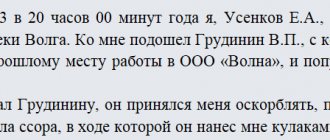Article 318 of the Code of Criminal Procedure of the Russian Federation. Initiation of a criminal case of private prosecution (current version)
1. Criminal cases for crimes specified in part two of Article 20 of this Code are initiated against a specific person by filing an application to the court by the victim or his legal representative, except for the cases provided for in paragraph 2 of part one and part four of Article 147 of this Code.
2. In the event of the death of the victim, a criminal case is initiated by filing an application by his close relative or in the manner established by part three of this article.
3. A criminal case is initiated by an investigator, as well as, with the consent of the prosecutor, by an inquiry officer in the cases provided for in part four of Article 20 of this Code. In this case, the investigator begins the preliminary investigation, and the interrogator begins the inquiry.
4. The entry of a prosecutor into a criminal case does not deprive the parties of the right to reconciliation.
5. The application must contain:
1) the name of the court to which it is filed;
2) a description of the crime event, place, time, as well as the circumstances of its commission;
3) a request addressed to the court to accept the criminal case for proceedings;
3.1) information about the victim, as well as documents proving his identity;
4) information about the person brought to criminal liability;
5) a list of witnesses who must be summoned to court;
6) signature of the person who submitted it.
6. The application is submitted to the court with copies according to the number of persons against whom a criminal case of private prosecution is being initiated. The applicant is warned of criminal liability for knowingly false denunciation in accordance with Article 306 of the Criminal Code of the Russian Federation, about which a note is made in the application, which is certified by the signature of the applicant. At the same time, the magistrate explains to the applicant his right to reconciliation with the person against whom the application was filed.
7. From the moment the court accepts the application for its proceedings, on which a decision is made, the person who filed it is a private prosecutor. The rights provided for in Articles 42 and 43 of this Code must be explained to him, about which a protocol is drawn up, signed by the judge and the person who filed the application.
8. If, after accepting the application for proceedings, it is established that the victim, due to a dependent or helpless state or for other reasons, cannot defend his rights and legitimate interests, then the magistrate has the right to recognize the participation in the case of the legal representative of the victim and the prosecutor as mandatory.
The legal mechanism for criminal liability for privately prosecuted crimes is characterized by inefficiency, which creates significant difficulties in citizens’ access to justice, including due to the lack of information about the mechanism for exercising their rights by filing an application directly to the court.
According to Part 2 of Article 20 of the Code of Criminal Procedure of the Russian Federation, private criminal prosecution is carried out for crimes provided for in Part 1 of Art. 115 of the Criminal Code of the Russian Federation (intentional infliction of minor harm to health), Part 1 of Art. 116 of the Criminal Code of the Russian Federation of the Criminal Code of the Russian Federation (beatings), part 1 of Art. 129 of the Criminal Code of the Russian Federation (libel) and Art. 130 of the Criminal Code of the Russian Federation (insult). These criminal cases are within the jurisdiction of a magistrate and are initiated against a specific person by submitting a corresponding application to the court by the victim or his legal representative.
Officials of the preliminary investigation bodies also have the right to initiate criminal proceedings in cases of this category - in cases where there is no statement from the victim, but the crime was committed against a person who, due to a dependent or helpless state, cannot protect his rights and legitimate interests, and the crime was committed a person whose details are unknown.
In cases of private prosecution, the victim has the right to seek protection of his violated rights, bypassing the stage of preliminary investigation, directly to the court.
At the same time, internal affairs bodies do not have the right to refuse to accept applications from citizens about crimes for which criminal prosecution is carried out in private, but are obliged by virtue of Art. 52 of the Constitution of the Russian Federation, which guarantees that the state provides victims with access to justice, take measures provided for by the criminal procedure law to preserve traces of the crime, establish the event of the crime, the persons who committed it, and transfer the collected materials to the court.
The applicant in cases of private prosecution can only be an individual who has suffered physical and (or) moral harm.
On behalf of a minor victim, an application may be submitted by his legal representatives (parents), guardians or trustees. On behalf of a person declared incompetent, an application may be submitted by his guardian.
In the event of the death of the applicant, a criminal case of private prosecution can be initiated by filing an application by his close relative to the court, if the information about the person who committed the crime is known, or, in their absence, to the preliminary investigation body.
The materials must contain documents (copies thereof) certifying the right to represent the interests of a minor, an incapacitated victim or certifying the death of the person on whose behalf the application is being submitted, and the right to represent his interests.
If the application meets the requirements provided for in Art. 318 part 5 of the Code of Criminal Procedure of the Russian Federation, a criminal case is initiated by filing an application to the court. Article 318 of the Code of Criminal Procedure of the Russian Federation provides that the application must contain:
1) the name of the court to which it is filed;
2) a description of the crime event, place, time, as well as the circumstances of its commission;
3) a request addressed to the court to accept the criminal case for proceedings;
4) information about the victim, as well as documents proving his identity;
5) information about the person brought to criminal liability;
6) a list of witnesses who must be summoned to court;
7) signature of the person who submitted it.
The application is submitted to the court with copies according to the number of persons against whom a private prosecution case is being initiated.
From the moment the court accepts the application for its proceedings, on which a decision is made, the person who filed it is a private prosecutor. The trial must begin no earlier than 3 and no later than 14 days from the date the application was received by the court.
Thus, having fulfilled the requirements of criminal procedural legislation when filing an application to the magistrate’s court as a private prosecution to bring the perpetrator to criminal liability, a citizen has the opportunity to protect his legal rights and interests in court independently.
Private prosecution cases
This category includes cases considered by the court on the basis of statements from victims. The investigation procedure and prosecutorial supervision are excluded. Only the victim has the initiative to initiate the case, and the involvement of the state, as a rule, is excluded.
All proceedings in the case take place in the magistrate's or military court at the place where the crimes were committed.
Art. 20 of the Code of Criminal Procedure classifies only a few acts as cases of private prosecution, for example, beatings. So, under Art. 318 of the Code of Criminal Procedure of the Russian Federation falls within few cases.
What are the application requirements?
It must be drawn up in writing and must contain the following information:
- name of the court (magistrate court of such and such area or garrison court);
- description of the crime event, time and place of the incident;
- information about the accused person (information from the passport);
- information about the applicant (information from the passport);
- request to the court: accept the application for proceedings;
- list of attached documents;
- Art. 318 of the Code of Criminal Procedure of the Russian Federation obliges to provide a list of witnesses;
- date and signature of the person submitting the application.
Copies of the attached documents are added to the application (examination report, power of attorney for a representative, etc.)
The number of copies of the statement depends on the number of accused, and one set is assigned to the judge.
In the application, the private prosecutor is obliged to report his awareness of liability for false denunciation in accordance with Art. 306 Code of Criminal Procedure.
The application allows you to ask for recovery of material and moral damage.
How can I get the information I need?
It is not always immediately clear that an incident is subject to a private prosecution. First of all, citizens call the police or send a statement to one of their departments. The application is considered, persons related to the incident are called (potential defendants, witnesses), documents and other sources of information are studied.
As a result of the check, police officers or the Investigative Committee may come to the conclusion that the case is not entirely within their competence.
Next, a decision is made to refuse to initiate a case, which explains the right to go to court in accordance with Art. 318 Code of Criminal Procedure of the Russian Federation. The applicant has the right to receive verification materials for research.
If there is no information about the person who, in the opinion of the applicant, committed the crime, an application is still submitted to the court. Why is explained below.
In case of violent acts, calling the police is useful because their employees will give a referral to the medical examination office.
Using the sample
Can I use a sample application? Art. 318 of the Code of Criminal Procedure of the Russian Federation affects a few elements of acts, but they differ significantly. There is a significant difference between rape and beatings; fraud has its own specifics, not to mention the fact that each individual case has a number of nuances.
It is advisable to study judicial practice on the elements of the crime. Reading judgments in specific cases will help you see how the law is applied, what arguments work, and how evidence is assessed. Judicial practice in each region has distinctive features, so it is advisable to study the practice of the court to which you plan to file an application.
Article 31. Jurisdiction of criminal cases
Information Commentary on the article Judicial practice Comments
1. The magistrate has jurisdiction over criminal cases of crimes for which the maximum penalty does not exceed three years of imprisonment, with the exception of criminal cases of crimes provided for in Articles 107 part one, 108, 109 parts one and two, 116.1, 134, 135, 136 part one, 146 part one, 147 part one, 151.1, 157, 158.1, 170, 170.2, 171 part one, 171.1 part one, three and five, 171.3 part one, 171.4, 174 part one and second, 174.1 parts one and two, 177, 178 part one, 183 part one, 185, 191.1 parts one and two, 193 part one, 193.1 part one, 194 part one, 195, 198, 199 part one, 199.1 part one, 199.2 part one, 199.3, 199.4 part one, 200.1, 201 part one, 202 part one, 205.6, 207, 212 part three, 215 part one, 215.1 part one, 215.3 part one, 215.4 part one, 216 part one, 217 part first, 217.2 part one, 219 part one, 220 part one, 225 part one, 228 part one, 228.2, 228.3, 234 parts one and four, 234.1 part one, 235 part one, 236 part one, 237 part one, 238 part the first, 239, 243 the first part, 243.1, 243.2 the first part, 243.3 the first part, 244 the second part, 247 the first part, 248 the first part, 249, 250 the first and second parts, 251 the first and second parts, 252 the first and second parts, 253 parts one and two, 254 parts one and two, 255, 257, 258 part two, 259, 262, 263 part one, 264 part one, 264.1, 266 part one, 270, 271, 272 part one, 273 part one, 274 part one, 285.1 part one, 285.2 part one, 286.1 part one, 287 part one, 288, 289, 292, 293 parts one and one.1, 294 parts one and two, 296 parts one and two, 297, 298.1, 301 part one, 302 part one, 303 part one and two, 306 part one and two, 307 part one, 309 part one and two, 311 part one, 314.1, 315 part one, 316, 322 part one, 323 part one, 327 part one, 327.1 part one and 328 of the Criminal Code of the Russian Federation.
(as amended by Federal Laws dated 04.07.2003 N 92-FZ, dated 08.12.2003 N 161-FZ, dated 01.06.2005 N 54-FZ, dated 05.05.2010 N 76-FZ, dated 22.07.2010 N 155-FZ , dated 04/06/2011 N 66-ФЗ, dated 11/21/2011 N 329-ФЗ, dated 12/07/2011 N 420-ФЗ, dated 03/01/2012 N 18-ФЗ, dated 07/28/2012 N 141-ФЗ, dated 06/28/2013 N 134-ФЗ, from 07/02/2013 N 186-ФЗ, from 07/23/2013 N 198-ФЗ, from 07/23/2013 N 245-ФЗ, from 12/21/2013 N 365-ФЗ, from 02/03/2014 N 5-ФЗ, dated June 28, 2014 N 179-FZ, dated July 21, 2014 N 277-FZ, dated December 31, 2014 N 528-FZ, dated December 31, 2014 N 530-FZ, dated February 3, 2015 N 7-FZ, dated July 13, 2015 N 228-ФЗ, from 07/13/2015 N 265-ФЗ, from 07/03/2016 N 324-ФЗ, from 07/06/2016 N 375-ФЗ, from 07/26/2017 N 203-ФЗ, from 07/29/2017 N 250-ФЗ, from 04/23/2018 N 114-FZ, dated 06/27/2018 N 157-FZ, dated 12/27/2018 N 509-FZ)
2. The district court has jurisdiction over criminal cases of all crimes, with the exception of the criminal cases specified in parts one (regarding the jurisdiction of criminal cases by the magistrate) and three of this article.
(as amended by Federal Laws dated May 29, 2002 N 58-FZ, dated November 2, 2013 N 302-FZ)
3. The Supreme Court of the Republic, a regional or regional court, a court of a federal city, a court of an autonomous region, a court of an autonomous district, a district (naval) military court have jurisdiction over:
1) criminal cases of crimes provided for in articles 105 part two, 131 part five, 132 part five, 134 part six, 228.1 part five, 229.1 part four, 277, 281 part three, 295, 317, 357 of the Criminal Code of the Russian Federation, for with the exception of criminal cases of crimes committed by persons under the age of eighteen, and criminal cases in which life imprisonment or the death penalty cannot be imposed as the most severe form of punishment in accordance with the provisions of part four of Article 62, part four of Article 66 and part four of article 78 of the Criminal Code of the Russian Federation, as well as criminal cases of crimes provided for in articles 126 part three, 209, 210 part four, 211 parts one - three, 212 part one, 227, 275, 276, 278, 279, 281 parts first and second, 353 - 356, 358, 359 parts one and two, 360 of the Criminal Code of the Russian Federation;
(Clause 1 as amended by Federal Law dated December 29, 2017 N 467-FZ)
2) criminal cases against a member of the Federation Council, a deputy of the State Duma, a judge of the Constitutional Court of the Russian Federation, a judge of a federal court of general jurisdiction or a federal arbitration court, a magistrate, a judge of a constitutional (statutory) court of a constituent entity of the Russian Federation at their request submitted before the start of the trial proceedings;
3) criminal cases, the materials of which contain information constituting a state secret.
(Part 3 as amended by Federal Law dated July 23, 2013 N 217-FZ)
4. Lost force on January 1, 2013. — Federal Law of December 29, 2010 N 433-FZ.
5. The garrison military court considers criminal cases of all crimes committed by military personnel and citizens undergoing military training, with the exception of criminal cases within the jurisdiction of higher military courts.
6. The district (naval) military court has jurisdiction over the criminal cases specified in part three of this article in relation to military personnel and citizens undergoing military training, as well as criminal cases transferred to the said court in accordance with parts four to seven of Article 35 of this Code.
(Part six as amended by Federal Law dated December 27, 2009 N 346-FZ)
ConsultantPlus: note. From the moment the Central District Military Court begins its activities, but no later than 10/01/2019, paragraph. 1 part 6.1 art. 31 is stated in a new edition (FZ dated November 12, 2018 N 413-FZ).
6.1. The Far Eastern District Military Court, the Moscow District Military Court, the Volga District Military Court and the North Caucasus District Military Court have jurisdiction over:
(as amended by Federal Law dated 06/07/2017 N 115-FZ)
1) criminal cases specified in parts three and six of this article;
ConsultantPlus: note. Criminal cases specified in paragraphs 2 - 4 of part six.1 of Article 31 of the Criminal Procedure Code of the Russian Federation, received by district (naval) military courts and not considered on the day the Federal Law of November 12, 2018 N 418-FZ came into force, are considered by the indicated courts in accordance with the rules of jurisdiction in force on the day the relevant cases were accepted for consideration.
ConsultantPlus: note. Criminal cases specified in paragraphs 2 - 4 of part six.1 of Article 31 of the Criminal Procedure Code of the Russian Federation, the jurisdiction of which is changed by Federal Law dated 06/07/2017 N 115-FZ in accordance with the territorial jurisdiction of district (naval) military courts and which have not been considered by the court on the day the said law came into force, are considered by the court that accepted them for consideration in accordance with the rules of jurisdiction in force on the day the relevant cases were accepted for consideration.
2) criminal cases of crimes provided for in articles 205, 205.1, 205.2, 205.3, 205.4, 205.5, 206, 211, part four, 361 of the Criminal Code of the Russian Federation;
(as amended by Federal Law dated July 6, 2016 N 375-FZ)
3) criminal cases of crimes provided for in Articles 277, 278, 279 and 360 of the Criminal Code of the Russian Federation, if their commission is associated with terrorist activities;
4) criminal cases of crimes, when assigning punishment for which the aggravating circumstance provided for in paragraph “p” of part one of Article 63 of the Criminal Code of the Russian Federation must be taken into account.
(Part 6.1 introduced by Federal Law dated 05.05.2014 N 130-FZ)
7. Lost power. — Federal Law of December 27, 2009 N 346-FZ.
7.1. If cases of crimes committed by a group of persons, a group of persons by prior conspiracy, an organized group or a criminal community are within the jurisdiction of a military court in relation to at least one of the accomplices, and the separation of a criminal case in relation to the remaining persons is impossible, these cases in relation to all persons are considered by the appropriate military court.
(Part 7.1 introduced by Federal Law dated December 29, 2010 N 433-FZ)
8. Military courts located outside the territory of the Russian Federation, when considering criminal cases in cases provided for by federal constitutional law, are guided by this Code.
(Part eight as amended by Federal Law dated December 27, 2009 N 346-FZ)
9. The district court and the military court of the appropriate level make, during pre-trial proceedings in a criminal case, the decisions specified in parts two and three of Article 29 of this Code.
10. The jurisdiction of a civil claim arising from a criminal case is determined by the jurisdiction of the criminal case in which it was brought.
ConsultantPlus: note. On identifying the constitutional and legal meaning of Article 32, see Resolution of the Constitutional Court of the Russian Federation dated 04/06/2006 N 3-P.
Actions of the court
The judge checks the application; if there are flaws in it, a period is given to correct them. The judge himself decides how much time to give the applicant.
If it is clear from the statement that there is no information about the alleged criminal, the judge is obliged to send the materials to the police for a preliminary investigation.
You can, of course, complain to the prosecutor’s office and not waste time on a statement, which will then end up in the police anyway, but there remains the risk of the prosecutor agreeing with the police. The court has no right to act differently in this situation. Otherwise, Part 1 of Art. 318 Code of Criminal Procedure of the Russian Federation.
In addition, the court's decision is more important than the prosecutor's decision.
Involvement of the prosecutor and investigator
During the trial, the judge has the right to recognize that the participation of the prosecutor in the case is necessary. In case of helplessness or dependence of the victim on the accused, due to which he may refuse to defend his rights.
Helplessness refers to circumstances associated with mental, neurological problems and minorities. A serious health condition, for example, cancer and other similar circumstances, can be included in the concept of helplessness.
Dependency involves the financial aspect of the relationship between the victim and the accused (employees and employers, relatives providing assistance or money, etc.)
By decision of the head of the investigative department or the body of inquiry, with the consent of the prosecutor, a case is initiated even without a statement from the victim, if his helpless or dependent state is established. In this case, the investigation is carried out in the general manner without filing an application in accordance with Art. 318 Code of Criminal Procedure of the Russian Federation.
Who has the right to submit an application?
This is the victim or his legal representative. If the victim has died, close relatives have the right to initiate proceedings. Who belongs to them according to the Code of Criminal Procedure? This includes: mother and father, brother and sister, adopted child and adoptive parent, husband and wife, grandfather and grandmother.
Those who are not confident in their own abilities have the right to use the help of a lawyer or attorney. He will draw up a statement and provide assistance during the proceedings. Ignorance of the law and the practice of its application can have a detrimental effect on the results of the process. In addition, the participation of a competent and experienced representative will have a positive impact on the behavior of a biased judge, as noted in Art. 318 of the Code of Criminal Procedure of the Russian Federation with comments.






